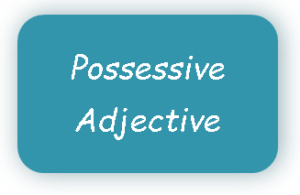Possessive adjectives:
Possessive Adjectives examples show the possession or ownership of something in the sentence. this adjective always followed the Noun. Her, My, His, It’s.
A: Possessive adjectives in English ask the possessor and not the thing possessed. Everything that a person or boy possesses is his thing;
everything that a lady or girl possesses is her thing:
Tom’s father is his father but
Mary’s father is her father.
Everything that an animal or something possesses is its thing:
A tree drops its leaves in autumn.
A happy dog wags its tail.
But if the sex of the animal is understood, his/her would often be used.
If there’s quite one possessor, there is used:
The girls are with their brother.
Trees drop their leaves in autumn.
Note that the possessive adjective remains an equivalent whether the thing possessed is singular or plural:
my socks, my socks his foot, his feet
B: Possessive adjectives are applied with clothes and parts of the body:
She changed her shoes. He injured his back.
C: to feature emphasis, own are often placed after my, your, his, etc. and after one’s;
my own room her own idea
own is often an adjective, as above, or a pronoun:
a room of one’s own
Note the expression:
I’m on my very own = I’m alone.
Possessive Adjective in sentences:
| Possessive Adjective | uses in the sentences |
| My | My car is red |
| Your | Your house is new |
| our | Our class is noisy |
| His | His clothes are dirty |
| Her | Her puppy is very cute |
| Their | Their home is very large |
| Its | Its color is beautiful |
| Your | Your child is a little weak in math |
| My | My laptop is out of order for the last two week |
it’s, they’re and there are no possessive adjectives.
Possessive adjectives are different from Possessive Pronouns. Posse. An adjective is always followed by a noun.
Possessive pronoun Possessive adjective
- Mine My
- Ours Ours
- Yours Your
- His His
- Hers His
- Theirs Their

